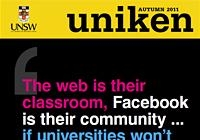University of the future
Is the university as we know it an endangered species? Get the full story in the first edition of Uniken for 2011.
Is the university as we know it an endangered species? Get the full story in the first edition of Uniken for 2011.

In the first issue of Uniken for 2011, we ask is the university as we know it an endangered species?
"Five years from now - on the web for free - you'll be able to find the best lectures in the world," the Microsoft billionaire, Bill Gates, said last year.
And in Gates' opinion, this constantly expanding digital smorgasbord of educational choices "will be better than any single university" in the world.
Another giant of the global digital communications revolution has a different spin.
In his blog, Sergey Brin, the 36-year-old co-founder of Google, proposes bypassing centuries of scientific epistemology to close the time lag between research breakthroughs in academia and their real-world application.
Gates and Brin enjoy a unique perspective when it comes to understanding the impacts - and exceptional opportunities - of new technology; they are steering change from the top. Whether this translates into a keen insight into the future of higher education is a more contentious question.
There's little doubt technology is not only changing the way we teach and learn, it is also challenging centuries-old academic structures and practices, the very notion of what it means to be literate and, potentially, the primacy of universities as the world's arbiters and repositories of knowledge.
Read the Uniken cover story by Louise Williams on pages 12 - 15.
Also in the Autumn issue, we meet Australia's first Muslim Test cricketer, Usman Khawaja, who is making another international debut, as UNSW's first Global Ambassador; and we explore an eerie, yet beautiful, film developed at the iCinema, one of the centrepieces of this year's Sydney Film Festival.
Contact: Susi Hamilton, Editor, 9385 1583